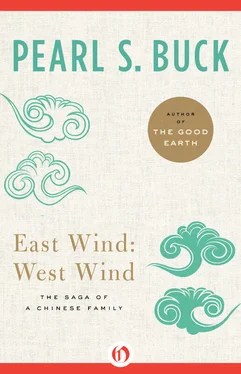At once I asked myself when I saw her, is she beautiful? But I answer, she is not beautiful. Her eyebrows are not delicate and moth-like, as we love to see a woman’s brows. They are dark and heavily marked above her brooding eyes. Beside hers, my brother’s face appears youthful, with rounded flesh and slighter bones. Yet she is only twenty — four years younger than he.
As for her hands, were her hands placed beside my brother’s and their bodies concealed, I would say his were the woman’s hands. His are soft with olive flesh. The bones of her hands protrude beneath the skin, and her wrists are much coarser than mine. When she grasped my hand I felt her palm was knotted and hard against mine. I mentioned it to my husband after breakfast when we were an instant alone. He said it is because of a game called tennis, which these foreign women play with their men — I suppose, to amuse them. How strangely do the foreign women woo love!
Her feet are longer by two inches than my brother’s feet — at least, it so appears. How embarrassing this must be to them both!
As for my brother, he is dressed in western clothes, and he is foreign to me in many ways. He moves quickly, and he is restless. When I look at him I cannot see anywhere the silvery, drooping youth he once was. Now his head is erect, and when he is not speaking his face is unsmiling. He wears no rings or ornaments of any kind, except a plain gold ring upon one hand on the third finger. This ring has not even a jewel of any kind set into it. The rigid dark clothes of the West mark more clearly his pallor.
Even when he sits, it is as foreigners sit, with one knee placed over the other. He speaks without effort the foreign language to my husband and to her, and the words roll from their mouths with a clatter like that of pebbles against a rock.
He is altogether changed. Even his eyes are changed. They are no longer cast down. They are swift and fearless, and they look boldly at the person to whom he speaks. He wears spectacles made curiously of gold and some sort of dark shell, and they make him in appearance older than he is.
But his lips are still the lips of our mother, thin, delicate, pressed together in repose. Only on my brother’s lips there hangs yet a trace of the old childish sullenness that always came when he was refused a desire. By this I knew my brother.
I and my son, we are the only Chinese among us, I think. They stand there in our house, wrapped in their strange dress, talking their strange tongue to each other. I and my son, we do not understand them.
They are to stay at our house until our father and our mother receive them. When it is known to my mother that I have allowed them to dwell here, she will be incensed at my unfilial roof. I tremble. Yet as my husband wishes, so it must be. And after all, is this not my brother, the son of one mother with me?
When we sit down to rice all together, she cannot eat with the chopsticks. I laugh secretly behind my sleeve because she cannot hold them even as well as my son holds them in his tiny hands. She grasps them firmly, and her brows knit themselves in her earnest endeavor to learn. But her hands are unskilled in delicate things. She knows nothing.
Her voice, My Sister, is not like any woman’s voice that I have heard. We like to hear a woman’s voice light and soft, like a small stream of water trickling between two rocks, or like the piping of little birds in the reeds. But her voice is deep and full, and since she speaks but seldom, one pauses to listen to it. It has the rich note of the voice of the harvest thrush in spring, when the rice is waiting to be cut into sheaves. When she speaks, her words fall in rapid phrases to my brother, to my husband. She does not speak to me for we do not understand each other.
Twice she has smiled, a quick, shining smile, springing up out of her eyes like a silver flash of sunshine on a sullen stream. When she smiles I understand her. She says, “Shall we be friends?” We look at each other doubtfully.
Then I answer silently, “When you see my son I shall know whether or not we can be friends.”
I dressed my son in his red silk coat and his green trousers. I placed upon his feet the cherry blossom embroidered shoes. Upon his head I placed his round crownless hat with the circle of tiny gold Buddhas about it, and on his neck I put a silver chain.
When he was garbed thus, he looked a very princeling, and I brought him to her. He stood before her on widespread legs and stared at her astonished. I bade him bow, and he placed his little hands together and bowed, staggering with his effort.
She gazed at him smiling. When he bowed she laughed aloud, a low laugh like a note struck from a deep bell, and then crying a sweet, unknown word, she seized him and held him against her and placed her lips upon his soft neck. His hat dropped off and from over his shaven head she looked at me. Such a look, My Sister! Her eyes said,
“I desire one exactly like him!”
I smiled, saying, “Then we shall be friends!”
I think I begin to see why my brother loves her.
Now the fifth day has passed since their coming. They have not yet presented themselves before my father and my mother. My husband and my brother spend hours together in troubled talk in the foreign tongue. I do not know what they have concluded. Whatever is done must be done slowly. Meanwhile, I watch the foreign one.
If you ask me what I think of her, My Sister, I do not know. Certainly she is not like our women. Every movement of her body is free and unrestrained and full of a rapid grace. Her gaze is direct and unafraid. Her eyes seek the eyes of my brother without shyness. She listens to the men speak, and then she throws into their talk a quick word, and they laugh. She is accustomed to men, as the Fourth Lady was.
And yet there is a difference between them. The Fourth Lady, it seemed to me, beneath the assurance of her beauty in the presence of men yet had fear. I think it was because she was afraid, even at the height of her loveliness, of the moment when it would begin to slip away from her and she would have nothing left wherewith to draw the hearts of men to her.
This foreign one has no fear of anything in her, although she is not beautiful as the Fourth Lady was beautiful. She does not trouble herself. She accepts as her right the interest of men. She makes no effort to win their glances. She seems to say, “This is I. I am as you see me. I do not care to be otherwise.”
I think she is very proud. At least she seems strangely indifferent to the difficulties she has brought into our family. She plays idly with my son, she reads books — she brought with her her many boxes of books — she writes letters. Such letters! I gazed over her shoulder, and the page was covered with large, sprawling marks, hooked each to the other. I could make nothing of any of it. But most of all she likes to sit in the garden dreaming, doing nothing at all. I have not once seen any embroidery in her hands.
One day she and my brother went out together early in the morning and returned at noon, dusty and earth-soiled. I asked my husband in great surprise where they had been to come back in such a condition. He replied,
“They have been for what westerners call ‘hike.’”
“What is this ‘hike’?” I asked, greatly curious. He replied,
“It is a long and rapid walk to some distant spot. To-day they have been to the top of Purple Mountain.”
“Why?” I asked in great surprise.
“They consider this a pleasure,” he answered.
It is very strange. Here even a farm woman would consider it a hardship to walk so far. When I said this to my brother he replied,
“Her life in her own country has been very free. She feels restrained in this little garden behind these high walls.”
Читать дальше











